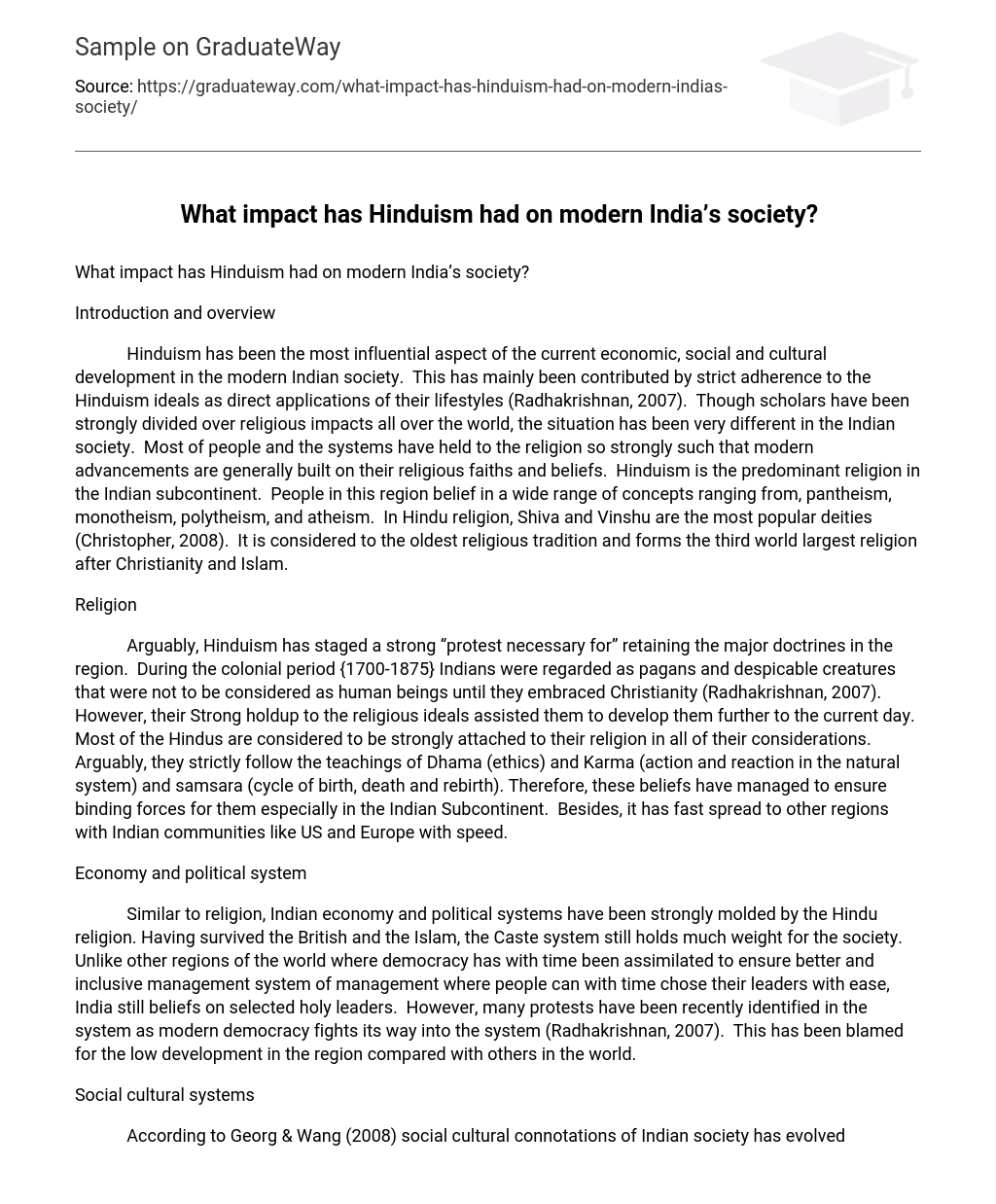Introduction and overview
Hinduism has been the most influential aspect of the current economic, social and cultural development in the modern Indian society. This has mainly been contributed by strict adherence to the Hinduism ideals as direct applications of their lifestyles (Radhakrishnan, 2007). Though scholars have been strongly divided over religious impacts all over the world, the situation has been very different in the Indian society. Most of people and the systems have held to the religion so strongly such that modern advancements are generally built on their religious faiths and beliefs. Hinduism is the predominant religion in the Indian subcontinent. People in this region belief in a wide range of concepts ranging from, pantheism, monotheism, polytheism, and atheism. In Hindu religion, Shiva and Vinshu are the most popular deities (Christopher, 2008). It is considered to the oldest religious tradition and forms the third world largest religion after Christianity and Islam.
Religion
Arguably, Hinduism has staged a strong “protest necessary for” retaining the major doctrines in the region. During the colonial period {1700-1875} Indians were regarded as pagans and despicable creatures that were not to be considered as human beings until they embraced Christianity (Radhakrishnan, 2007). However, their Strong holdup to the religious ideals assisted them to develop them further to the current day. Most of the Hindus are considered to be strongly attached to their religion in all of their considerations. Arguably, they strictly follow the teachings of Dhama (ethics) and Karma (action and reaction in the natural system) and samsara (cycle of birth, death and rebirth). Therefore, these beliefs have managed to ensure binding forces for them especially in the Indian Subcontinent. Besides, it has fast spread to other regions with Indian communities like US and Europe with speed.
Economy and political system
Similar to religion, Indian economy and political systems have been strongly molded by the Hindu religion. Having survived the British and the Islam, the Caste system still holds much weight for the society. Unlike other regions of the world where democracy has with time been assimilated to ensure better and inclusive management system of management where people can with time chose their leaders with ease, India still beliefs on selected holy leaders. However, many protests have been recently identified in the system as modern democracy fights its way into the system (Radhakrishnan, 2007). This has been blamed for the low development in the region compared with others in the world.
Social cultural systems
According to Georg & Wang (2008) social cultural connotations of Indian society has evolved with time being directly derived from expression of faith that revolves around Hindu culture which has formed a direct nurturing and transmitting vessel for the religious personal and societal ideals. Sanskkirt and Sankrirti (culture) of the Hindus have been strongly superimposed by the fast developing western cultures in music, art, education, relationship, dressing, urban life Varmashrama and simple thinking. Indian society belief in righteousness (dharma), livelihood and liberation freedom that are based on Krishna teachings of holiness. Theologists argue that Indian society upholds sacred lifestyle as a guarantee of good rebirth after death.
Conclusion
Hinduism has been the most influential aspect of the current economic, social and cultural development in the modern Indian society. All the systems in the Indian society are intrinsically and explicitly derived from the teachings of Krishna which must be followed and are subjective to consideration for later rebirth. However, the system is strongly being affected by the western systems of governance, culture and social lifestyles which are fast embedded themselves to it.
Reference list
Christopher, H. (2008). Religious Transformation in South Asia: The Meanings of Conversion in Colonial Punjab. Oxford: Oxford University Press US.
Georg, I. & Wang, E. (2008). A Global History of Modern Historiography. New Jersey: Pearson Longman.
Radhakrishnan, S. (2007). Religion and Society. London: READ BOOKS.





